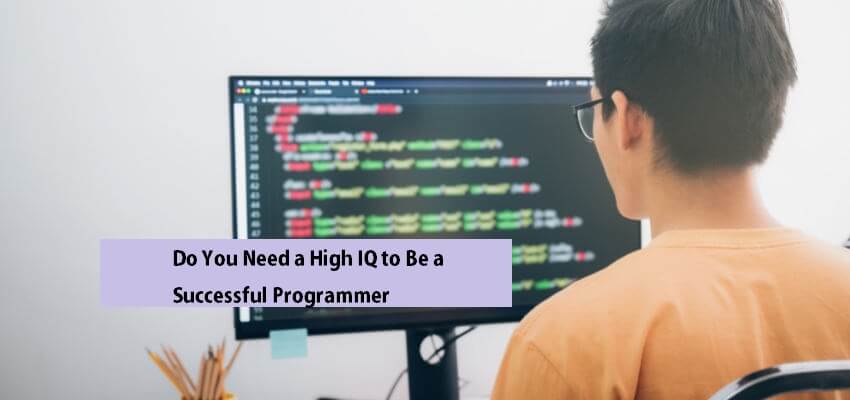
Programming is often considered a domain for the intellectually elite, conjuring images of geniuses solving complex problems quickly. This perception might lead many aspiring programmers to wonder: “Do You Need a High IQ to Be a Successful Programmer?” While intelligence plays a role, success in programming is about much more than IQ. Skills like persistence, creativity, problem-solving, and the ability to learn continuously weigh heavily in a programmer’s journey. This article explores the relationship between IQ and programming, breaks down myths, and provides actionable insights to help you succeed—regardless of your IQ score. We’ll also discuss intriguing concepts like the “average IQ programmer,” the impact of brain types, and even the role of activities like “reading snacks” in shaping your coding skills. Let’s dive into the programming world and debunk the myths surrounding IQ.
What Does IQ Really Measure?
IQ, or Intelligence Quotient, measures cognitive abilities such as reasoning, problem-solving, and understanding. While equating IQ with success is tempting, it’s only one piece of a much larger puzzle. A high IQ may indicate analytical strength, but it doesn’t necessarily mean you’ll excel in programming.
Programming requires a blend of:
- Logical Thinking: Breaking down problems systematically.
- Creativity: Finding innovative solutions.
- Communication: Collaborating with teams and translating ideas into code.
- Emotional Intelligence: Managing stress and working well with others.
IQ doesn’t solely dictate these traits. Studies suggest that grit and adaptability often outweigh raw intelligence in predicting success.
Debunking the Myth: The “Genius Programmer”
The stereotype of the “genius programmer” who codes effortlessly is misleading. Programming is a skill that can be learned and honed over time. Most successful programmers fall within the “average IQ programmer” range (IQ scores between 90 and 110). They succeed because of their dedication to mastering the craft, not because of an innate intellectual advantage.
Success Stories of Average IQ Programmers
Many renowned programmers started with no prior experience or extraordinary IQ scores. For example:
- John Carmack, co-creator of Doom, attributes his success to persistence and passion, not IQ.
- Margaret Hamilton, who led NASA’s software development for the Apollo missions, focused on meticulous attention to detail and problem-solving.
These stories prove that determination and skill-building can surpass natural ability.
The Role of Problem-Solving Skills
Programming is fundamentally about solving problems. Whether debugging code, designing algorithms, or optimizing performance, a programmer’s success hinges on their ability to tackle challenges methodically. While IQ might aid logical reasoning, problem-solving is a skill anyone can develop through practice.
How to Improve Problem-Solving:
- Break Problems into Smaller Steps: Simplify complex tasks.
- Practice Regularly: Tackle coding challenges on platforms like LeetCode or HackerRank.
- Learn from Mistakes: Debugging is a great way to understand programming deeply.
Learning Programming: A Skill for Everyone
Programming isn’t an exclusive club for high-IQ individuals. It’s more accessible than ever, thanks to free resources, coding boot camps, and online communities. Research shows that structured practice and consistent effort can lead to mastery, regardless of initial aptitude.
Tips for Beginners:
- Start with beginner-friendly languages like Python or JavaScript.
- Use online resources like Codecademy, freeCodeCamp, or Coursera.
- Join coding communities for support and motivation.
Emotional Intelligence: The Unsung Hero
Success in programming isn’t just about writing code. It’s about collaboration, adaptability, and resilience. These qualities fall under emotional intelligence (EQ), which can be more impactful than IQ.
Why EQ Matters:
- Teamwork: Programmers often work in teams to build and maintain projects.
- Communication: Explaining technical concepts to non-technical stakeholders.
- Stress Management: Handling tight deadlines and debugging challenges.
Developing EQ can be as simple as practicing mindfulness, improving communication skills, and seeking feedback.
The Connection Between Brain Types and Programming
An intriguing aspect of programming success is the role of “brain types.” While brain type isn’t a formal scientific concept, some argue that specific cognitive patterns or neurological traits influence problem-solving and creativity.
Is Brain Type 8 Bipolar?
Brain Type 8, often associated with traits like innovation, curiosity, and high energy, has been loosely linked to bipolar tendencies. While there’s no direct evidence connecting Brain Type 8 to programming success, some traits associated with this brain type—such as divergent thinking—can be advantageous in coding.
However, success in programming doesn’t require a specific brain type. All cognitive styles have unique strengths.
Building Habits for Success
Habits play a crucial role in programming. Creating an environment conducive to learning and productivity can help you excel.
Role of “Reading Snacks”
“Reading snacks” are short, digestible information or activities that enhance learning without overwhelming the brain. Incorporating reading snacks into your routine can improve focus and retention.
Examples:
- Micro-Learning: Spend 5-10 minutes reading coding tips or blog posts.
- Interactive Challenges: Solve one coding problem daily.
- Code Review: Analyze small snippets of others’ code to learn best practices.
The Journey of Continuous Learning
Programming is a rapidly evolving field. Staying updated with the latest tools, languages, and frameworks is essential for long-term success. This requires a mindset of lifelong learning, not a high IQ.
Strategies for Continuous Learning:
- Follow Trends: Read tech blogs and follow industry leaders.
- Experiment: Build personal projects to apply new concepts.
- Upskill: Take advanced courses or certifications.
Final Thoughts: Do You Need a High IQ to Be a Successful Programmer
Programming is a field where passion and perseverance often trump raw intelligence. While IQ can provide a cognitive edge, it’s not the defining factor for success. Attributes like creativity, problem-solving, emotional intelligence, and the ability to learn consistently are far more critical.
Whether you identify as an “average IQ programmer” or someone with unique cognitive traits, remember that programming is a skill anyone can master with the right approach. Embrace the journey, leverage resources like “reading snacks,” and focus on building habits that support growth. Success in programming is within your reach—regardless of your IQ.

